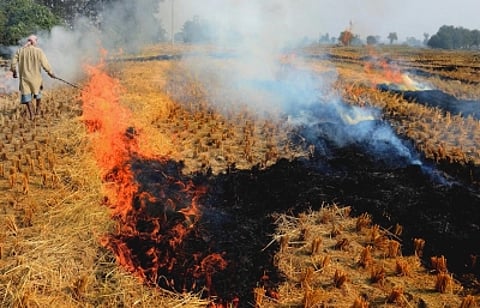

The Supreme Court on Wednesday suggested that governments consider strict action, including arrests, to deter stubble burning, but farmers across Punjab say they are left with no practical alternative because of state inaction and failed support systems.
Chief Justice of India B.R. Gavai, heading the Bench, remarked that jail terms could send the “correct message” to violators. But on the ground, frustration is growing among farmers who believe they are being made scapegoats for a systemic crisis.
Gurpal Singh, a farmer from Kapurthala, asked, “The government tells us not to burn, but where are the machines? Renting a Happy Seeder costs Rs 2,000–2,500 per acre. Who will bear that? We have only 15–20 days to clear fields before wheat sowing. Burning takes one day, machines take too long. Will the government come and sow our wheat if we wait?”
For small and marginal farmers, the problem is even starker. Rajwinder Kaur, farm leader explained, “We don’t have big tractors to use heavy machines. We can’t afford labour, because cutting and removing stubble manually costs more than the crop itself. Burning is free. It may be harmful, but it is our only option when the state does not give real help.”
Despite subsidies, farmers say the promised machinery either arrives late or is concentrated in select villages. Gurdial Singh, another farmer said, “Every year officials say machines are coming. Even if they do, one machine for a whole block of villages makes no difference. By the time our turn comes, it is too late. What else can we do except burn?”
Experts note that while states like Haryana and Uttar Pradesh have adopted decomposer sprays and stronger monitoring mechanisms, Punjab remains heavily dependent on the paddy–wheat cycle. Without large-scale diversification, stubble generation remains massive and alternatives inadequate.
Farmer unions also argue that strict actions will backfire. Jaswinder Singh, a union leader from Ludhiana, said, “Threatening farmers with jail or fines will not stop burning. It will only create anger. The real failure is of the state and central governments, who have known this issue for years but still push paddy cultivation. Until policies change, we will keep facing the same problem every winter.”
Even the Punjab government’s “red entry” system, which blocks erring farmers from selling in mandis, has drawn criticism. Farmers say it punishes them financially without offering solutions. “We are being told not to burn, but not given any alternative in time. How can this be justice?” asked Jaspal Singh, a young farmer from Sangrur.
The Supreme Court, meanwhile, is set to hear the matter again next week, but its suggestion of arrests has deepened the divide. While the court seeks deterrence, farmers argue they are trapped by short sowing windows, rising costs, and lack of accessible technology — leaving fire as their only practical choice.